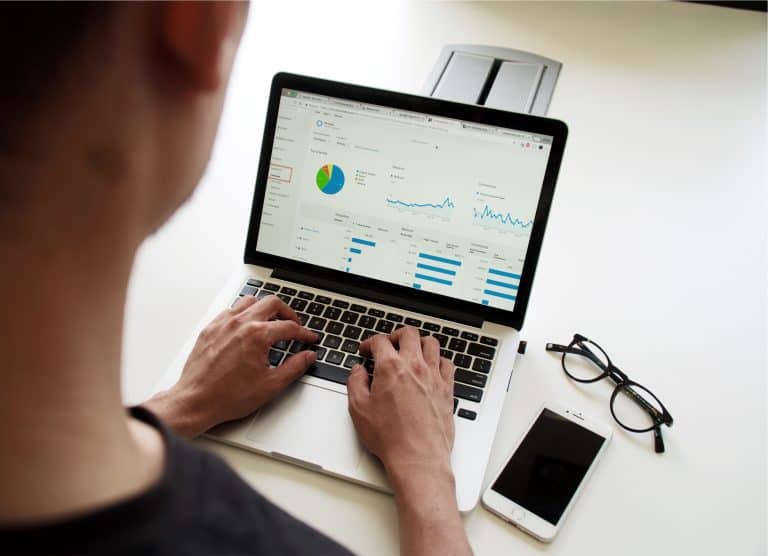How to track your money (Simple ways to understand what is going on)
We all earn or spend money, but some of us manage to keep more of t than others.
These are often the people who track and manage their money.
If you track your money it will help you see where, when and what you are spending your money on. It will also show whether this is in line with your goals and what might need to change to spend less and save more. Use a spending plan to reach your goals.
In this article, we will cover how to track your money so you can answer the question:
Where is my money going?

Where does your money come from?
The first step is to understand where and how much money you have coming in.
Predominantly this is going to be from your income, but could also be savings interest, rental properties, benefits and or side hustles.
Being clear how much money is coming in and from where can help you see which is the most lucrative, regular and substantial sources of income. It may also help you to know whether it is coming in from a few directions or only one—either of these showing you how secure or otherwise your sources of income might be.
Where does all your money go?
Now we move onto where it is all going. This will likely be the most enlightening as we often think we know where our money is going but often have very few of the details.
Tracking spending is pivotal to understanding what, where, when and how you spend your money.
What you spend your money on will help you see the categories, i.e. food, travel, rent. What most of your money is being spent on. This could be very enlightening if you realise your spending most of your money on things you can’t even remember buying.
If you buy lunches or food for work while at work, you might be surprised how quickly eating out, even for small snacks or meals, mount up.
Where your spending your money will hint at your habits also. Is most of your money going on one or two stores? Is this because the store is on your way to work or right buy your office? Is most of your spending online?
When do you spend money?
When do you spend most of your money? Again, this will indicate when you might be most vulnerable to spending money is it at lunchtimes, early or late in the day? Timings could note where you might be and the frame of mind you are in. If its early in the morning is that the route to work. If its late at night is that because when you start surfing the internet or when you are generally tired and or bored?
The timing of spending might also indicate how conscious the spending is. Zombie purchases very late in the night or early morning when you are unlikely to be thinking clearer might give an idea this is when you at risk of poor spending choices.
How you spend your money might hint at the convenience of spending money. Is it all by card or by cash? If you know this, not taking out your cards might help slow the spending down when you go out. Or if it’s all by cash could you take out the week’s planned spending in cash at the beginning and force your self to live off that and no more? Seeing the fixed amount in your wallet might help you to be a more conscious spender.
Knowing whether you are spending all or more than you bring in will show how close to the rocks of financial ruin you are sailing. If you are spending all or most of your money, you are probably only one or two paycheques away from disaster.
Let this be a revelation that spurs you into action to live within your means or increase your means.
How to track your money
Your bank and credit card statements will be a good starting point to track your money and where it goes. Some accounts will already categorise it for you making the analysis easy. Especially if online. This means that some or all of the tracking may be happening for you without much effort on your part.
If not you can get a simple spreadsheet together with all the key categories, reviewing your bank statements and receipts to put together a picture of your spending.
Key categories are likely to be:
- Food
- Travel
- Rent, mortgage
- Lunches or snacks
- Utilities
- Hobbies or interests
- Clothes
- Childcare
- Giving
- Add more categories as needed.
Nowadays though there are countless apps available, that will do a lot of this for you instantly analysing it and categorising it. One option is Money Dashboard * (Affiliate link). If you want to compare more of the apps here is an excellent article by money to the masses.
It all depends on how much you enjoy looking at the figures and how much time you have/want to give to it.
Are you happy with that?
Now you know where it’s all going you can review if you’re happy with that. Are you spending more or less than you thought overall or on specific things? Is there anything within your spending that surprised you, and why are you surprised? Was it more or less what you thought?
Often you can be surprised once it is there in black and white. Now you can finally see what is going on. An up to date tracker will show you what you are focusing your energy on (your money) and what you are valuing the most at that time.
If you see you’re not saving anything or that much, it indicates that you probably don’t value it that much. Would be interesting to understand why you don’t appreciate savings that much? Is it because you have no plans to spend the money?
If all your money goes on takeaways, it might show you that you love convenience or can’t be bothered to cook. Part of this may be the lack of ideas, cooking skills or planning out the prep time needed.
Set saving goals
Now you know where it’s going its time to take a more active role in sending your money where you want it to go.
How much would you like to save? Spend on going out vs have left at the end of the month?
Now you are moving into taking more control of your finances and figuring out what’s important to you and becoming less passive.
No longer will money trickle through your fingers, but you are sending it to the places where you want to do the things you want.
You can set a simple figure or a percentage to save. Make it relatively easy to start with. Get some wins under your belt before going to hard of cutting down here there and or everywhere. Building and maintaining momentum will be your key to success.
Like any fitness programme, you need to build strength and muscle slowly. This way, you can build up your savings muscle. You would never pile straight into the heaviest weights or run a marathon straight away. Build up slowly. Remember the long term trend is your friend.
A key thing to have in your mind when setting a savings goal is what you are going to spend the money on. This might sound counterintuitive, but what are you saving for if you have nothing to look forward to / spend the money on?
To make the goal a real priority for you, carrot and stick, i.e., if I save that money, I can go on that dream holiday. If I don’t, I will have to stay in the UK on holiday and accept whatever the weather is (most likely rain).
What gets measured gets done.
If you track and set goals, you will start to focus on that thing and see the progress or lack of it.
How much do you want to save per week or per month? Do you want to cut down on eating out or reduce your utility bills?
If you set a target and monitor it, you will create far more energy and will to achieve it. Gamifying it, i.e., shaving off some costs each day or week and looking for cheaper alternatives will help make it a little more fun rather than just an exercise to spend less.
Tracking your goals helps you set a clear path to that holiday or buy that present because you have sent yourself a target, tracked your progress and know when you have achieved it. The sense of accomplishment will feel great.
Change your spending habits
Now you know where, when and how you spend your money, you can also track the habits that might help or hinder you.
Is that late night internet surfing causing you to spend more money? Can you get a book instead or go to bed early to avoid the temptation.
Is the lunchtime sandwich spending an indication of a lack of preparation to make your lunches at home? Could you batch cook on the weekend to prepare a week of lunches? Set a meal plan to help with ideas for food rather than just going for the easy take out options.
Are the regular take out coffees an indication of tiredness or the route you take to work? If you slept better and walked differently, would that alter your spending patterns?
Can you cut out / cut off the social media and email alerts form shops? The constant prompts to buy things might be one of your significant triggers to spend money. If they weren’t there, would you still have the desire to get the items?
Knowing yourself and your triggers, like hunger, sales, envy over new gadgets, could help you start to avoid or control them. Once you know your triggers, you can try to modify your behaviour. Avoiding things that activate your need to spend, a different route to work, avoiding spendaholic friends, no internet after 10 pm.
Stick with the plan or adjust the plan.
Daily and weekly check-ins with your spending plan will help you see if you are on track. Its will also indicate where things are going ok or where they are slipping.
If things are becoming too difficult, you can give yourself some slack and enjoy some of your money. Knowing that you are in control can help you enjoy your money more as its all part of a plan.
Just like when you are on a journey, you keep checking the map to ensure you are not heading in the wrong direction. Your spending plan will help you ensure you are staying within your means and heading towards your goals.
Remember a budget is there to set you free from living paycheck to paycheck. It’s not to make you miserable but to guide you to a better and happier financial future.
Let me know if you have any budgeting and spending habits tips or tricks.
FAQ: Tracking your money
How to manage spending habits?
You can do a few key things to manage your spending habits effectively.
First, make sure that you have a clear understanding of your income and expenses. This will help you set budgeting goals and track your progress over time.
Secondly, consider creating a spending plan or budget. This will help you allocate your funds to align with your financial goals.
Finally, make sure to assess your spending habits regularly and adjust as needed. By taking these steps, you can better manage your finances and ensure that your spending aligns with your long-term financial goals.
What does it mean to track your money?
When you track your money, you track where it goes and how much is left over.
This can be done in a variety of ways, including using a budget or tracking app, writing down your expenses each day, or creating a spreadsheet with all your finances neatly organized.
The goal is to better understand where your money is going and what you can do to save more. It’s also helpful for identifying areas where you might be able to cut back on spending and free up more money for savings or investments.
Tracking your money can be extremely useful for taking control of your finances and reaching your goals.
How to track my money?
Tracking your money involves monitoring and recording all of your income and expenses. Here are some steps to help you get started:
Keep track of all your income: This includes your salary, any freelance work, and any other income sources.
Record your expenses: Write down all of your expenses, including bills, groceries, entertainment, and any other purchases you make.
Categorize your expenses: Group your expenses into categories such as housing, transportation, food, and entertainment.
Create a budget: Use your income and expense data to create a budget that outlines your spending limits for each category.
Review your spending regularly: Check your spending regularly to ensure that you are sticking to your budget.
Use a budgeting app: Consider using a budgeting app or software to help you track your money automatically.
By tracking your money, you can identify areas where you can cut back on expenses, create a savings plan, and make informed financial decisions.
How do I keep track of my money?
To keep track of your money, you can:
Use a budgeting app or software that allows you to track your income, expenses, and savings goals.
Keep a record of your transactions by manually logging them in a spreadsheet or notebook.
Review your bank and credit card statements regularly to track your spending.
Categorize your expenses to identify areas where you can cut back and save more.
Set financial goals and regularly monitor your progress towards them.
Automate your savings and bill payments to ensure consistent contributions and avoid late fees.
Stay mindful of your spending habits and make conscious decisions about where your money goes.
Periodically evaluate and adjust your budget as your financial situation and goals evolve.
Remember, the key is finding a method that works best for you and helps you understand your income, expenses, and savings clearly.
Is there an app that tracks where your money goes?
Yes, there are several apps available that can help track where your money goes. Here are some examples from both the UK and the US:
In the UK:
Money Dashboard: Money Dashboard is a popular personal finance app in the UK. It allows you to connect and view all your bank accounts in one place, categorize transactions, set budgets, and track your spending habits. Website: moneydashboard.com
Yolt: Yolt is an app that provides an overview of your accounts and spending habits. It allows you to categorize transactions, set budgets, and track your financial progress. Yolt also offers additional features like bill tracking and saving goals. Website: yolt.com
Emma: Emma is a money management app that connects to your bank accounts and credit cards, tracks your spending, and helps you save money. It provides insights into your subscriptions, categorizes expenses, and allows you to set budgets. Website: emma-app.com
In the US:
Mint: Mint is a widely used personal finance app in the US. It allows you to connect your bank accounts, credit cards, and bills. Mint categorizes transactions, provides budgeting tools, and sends alerts to help you track your spending and financial goals. Website: mint.com
Personal Capital: Personal Capital is a comprehensive financial app that tracks your accounts, spending, investments, and net worth. It provides a holistic view of your finances, helps you manage your budget, and offers investment advice. Website: personalcapital.com
These apps can be great tools to track your spending, manage your finances, and gain insights into your money habits. Remember to review the features and terms of each app to find the one that best suits your needs and preferences.
Take Action on your life and finances now!
Are you in your 40s and feeling the financial squeeze? You’re not alone. This can be a challenging time financially, as you may be:
- Juggling mortgage payments 🏠
- Managing family expenses 👨👩👧👦
- Planning for retirement 🏖️
- Saving for your children’s college education 🎓
- Paying off lingering debts 💳
It’s time to stop the stress and start your journey to financial happiness. Financial coaching can provide the tools and guidance you need to navigate these challenges. With coaching, you can:
- Create a realistic and manageable budget 💼
- Develop a clear and achievable savings plan 🐖
- Learn effective strategies for debt repayment 🔄
- Understand and plan for future financial needs 📈
- Start saving and investing for financial independence 💰
- Gain peace of mind knowing you’re on the right track 😌
Don’t let financial worries cloud the prime of your life. Schedule a call with me today at Financially Happy Money Coaching, and let’s turn your financial stress into financial success!
Together, we can build a plan that aligns with your goals and sets you on a path to financial freedom. Let’s make your money work for you, not vice versa. 💪💰







